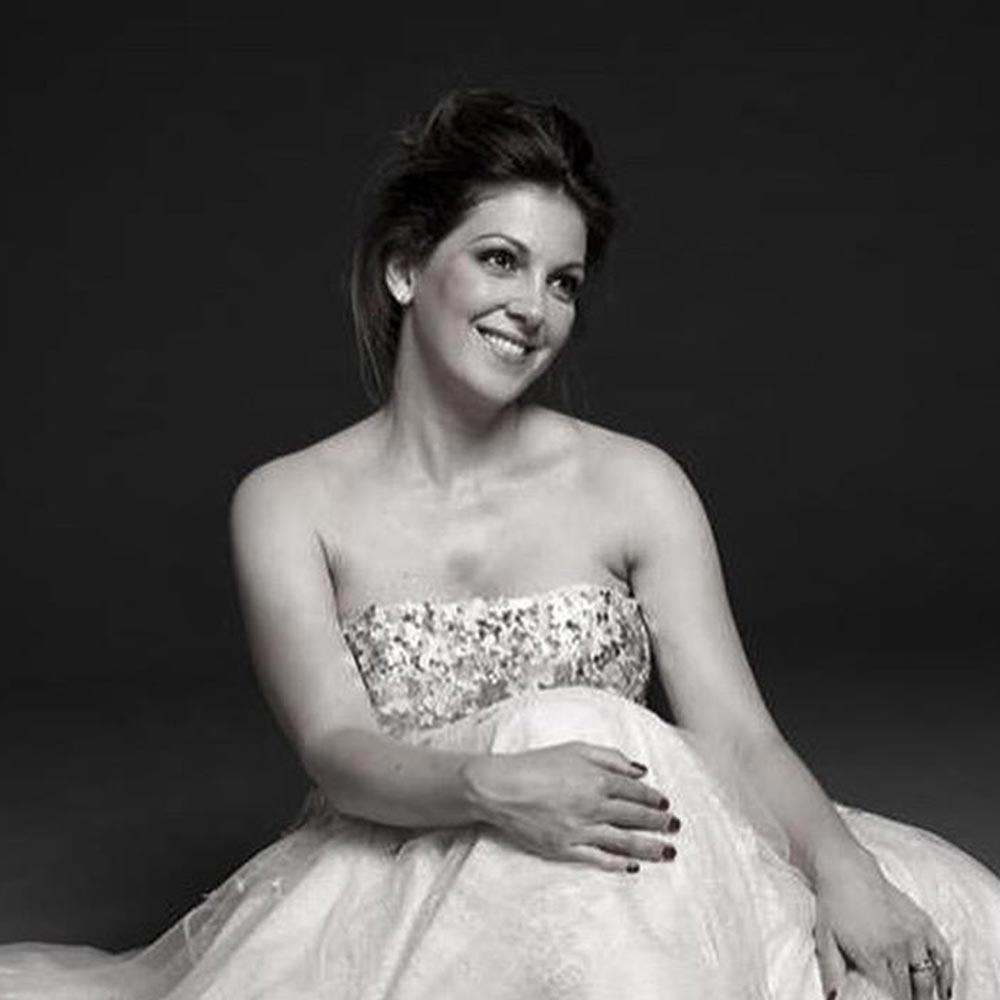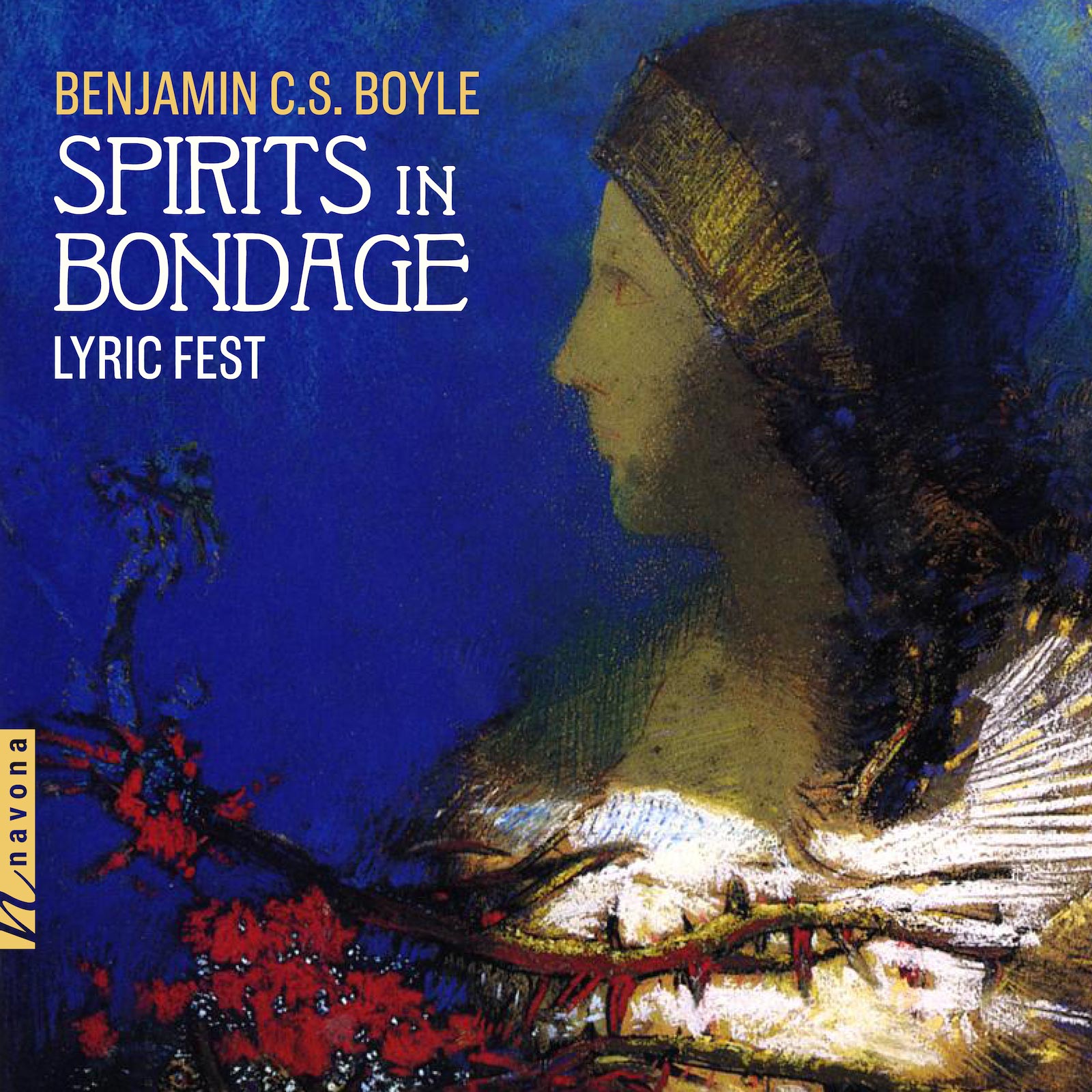Spirits In Bondage
Benjamin C.S. Boyle composer
Lyric Fest
Poetry and music have often been described as “beautiful sisters” in the European tradition, and American composer Benjamin C. S. Boyle sets out to prove just how harmonious this kinship can be. Owing to pianist and art song expert Laura Ward as well as to a selection of top-class singers, these elaborate yet easily accessible vocal compositions are resplendently brought to life on SPIRITS IN BONDAGE.
The lyrics underpinning this double album are often fantastical, but Boyle prudently renounces any notion of musical pomp and instead sets them in an agreeably-reduced, crystal-clear tonal language. Ward and her high-carat assortment of vocalists empathetically, wisely oblige and perform them likewise – and the result is magnificent.
Listen
Stream/Buy
Choose your platform
Track Listing & Credits
| # | Title | Composer | Performer | |
|---|---|---|---|---|
| Disc One | ||||
| 01 | Lenoriana, Op. 4: Annabel Lee | Benjamin C.S. Boyle | Laura Ward, piano; Randall Scarlata, baritone | 4:24 |
| 02 | Lenoriana, Op. 4: Lenore I | Benjamin C.S. Boyle | Laura Ward, piano; Randall Scarlata, baritone | 4:10 |
| 03 | Lenoriana, Op. 4: To __ | Benjamin C.S. Boyle | Laura Ward, piano; Randall Scarlata, baritone | 1:46 |
| 04 | Lenoriana, Op. 4: The Conqueror Worm | Benjamin C.S. Boyle | Laura Ward, piano; Randall Scarlata, baritone | 4:30 |
| 05 | Lenoriana, Op. 4: Intermezzo | Benjamin C.S. Boyle | Laura Ward, piano; Randall Scarlata, baritone | 2:18 |
| 06 | Lenoriana, Op. 4: El Dorado | Benjamin C.S. Boyle | Laura Ward, piano; Randall Scarlata, baritone | 1:59 |
| 07 | Lenoriana, Op. 4: Lenore II | Benjamin C.S. Boyle | Laura Ward, piano; Randall Scarlata, baritone | 5:36 |
| 08 | Lenoriana, Op. 4: A Dream within a Dream | Benjamin C.S. Boyle | Laura Ward, piano; Randall Scarlata, baritone | 1:54 |
| 09 | Lenoriana, Op. 4: To Helen | Benjamin C.S. Boyle | Laura Ward, piano; Randall Scarlata, baritone | 3:54 |
| 10 | Zelda’s Dream, Op. 35 | Benjamin C.S. Boyle | Laura Ward, piano; Kelly Ann Bixby, soprano | 4:21 |
| 11 | Le dormeur du Val, Op. 42 | Benjamin C.S. Boyle | Laura Ward, piano; Bryan Hymel, tenor; Barbara Prugh, trumpet | 3:34 |
| 12 | Reverie and Lullaby, Op. 38: Reverie | Benjamin C.S. Boyle | Laura Ward, piano; Devony Smith, mezzo-soprano | 2:36 |
| 13 | Reverie and Lullaby, Op. 38: Lullaby | Benjamin C.S. Boyle | Laura Ward, piano; Devony Smith, mezzo-soprano | 3:23 |
| 14 | Trois Chansons, Op. 11: Le flambeau vivant | Benjamin C.S. Boyle | Laura Ward, piano; Sarah Shafer, soprano | 3:47 |
| 15 | Trois Chansons, Op. 11: Harmonie du soir | Benjamin C.S. Boyle | Laura Ward, piano; Sarah Shafer, soprano | 2:48 |
| 16 | Trois Chansons, Op. 11: Sonnet d’automne | Benjamin C.S. Boyle | Laura Ward, piano; Sarah Shafer, soprano | 3:33 |
| 17 | Guinevere, Op. 29 | Benjamin C.S. Boyle | Laura Ward, piano; Hannah Ludwig, mezzo-soprano | 7:18 |
| Disc Two | ||||
| 01 | Chansons de Diane, Op. 24: Sisina | Benjamin C.S. Boyle | Laura Ward, piano; Irini Kyriakidou, soprano; Bryan Hymel, tenor | 2:13 |
| 02 | Chansons de Diane, Op. 24: Parfum exotique | Benjamin C.S. Boyle | Laura Ward, piano; Irini Kyriakidou, soprano; Bryan Hymel, tenor | 4:22 |
| 03 | Chansons de Diane, Op. 24: La priere d’un païen | Benjamin C.S. Boyle | Laura Ward, piano; Irini Kyriakidou, soprano; Bryan Hymel, tenor | 2:47 |
| 04 | Chansons de Diane, Op. 24: La beauté | Benjamin C.S. Boyle | Laura Ward, piano; Irini Kyriakidou, soprano; Bryan Hymel, tenor | 4:11 |
| 05 | Ophelia, Op. 3 | Benjamin C.S. Boyle | Laura Ward, piano; Kelly Ann Bixby, soprano | 7:41 |
| 06 | Folksongs from another World, Op. 25: A Nymph’s Passion | Benjamin C.S. Boyle | Laura Ward, piano; Hannah Ludwig, mezzo-soprano | 1:32 |
| 07 | Folksongs from another World, Op. 25: The Message | Benjamin C.S. Boyle | Laura Ward, piano; Hannah Ludwig, mezzo-soprano | 2:53 |
| 08 | Folksongs from another World, Op. 25: To Music, to Becalm his Fever | Benjamin C.S. Boyle | Laura Ward, piano; Hannah Ludwig, mezzo-soprano | 4:43 |
| 09 | Folksongs from another World, Op. 25: Dawn | Benjamin C.S. Boyle | Laura Ward, piano; Hannah Ludwig, mezzo-soprano | 1:32 |
| 10 | Folksongs from another World, Op. 25: Karolin’s Song | Benjamin C.S. Boyle | Laura Ward, piano; Hannah Ludwig, mezzo-soprano | 2:41 |
| 11 | Songs of Virtue and Loss, Op. 30: Survival | Benjamin C.S. Boyle | Laura Ward, piano; Kelly Ann Bixby, soprano | 2:33 |
| 12 | Songs of Virtue and Loss, Op. 30: Patience | Benjamin C.S. Boyle | Laura Ward, piano; Kelly Ann Bixby, soprano | 3:45 |
| 13 | Spirits in Bondage, Op. 40: Prolouge | Benjamin C.S. Boyle | Laura Ward, piano; Dan Teadt, baritone | 2:48 |
| 14 | Spirits in Bondage, Op. 40: Satan Speaks | Benjamin C.S. Boyle | Laura Ward, piano; Dan Teadt, baritone | 1:09 |
| 15 | Spirits in Bondage, Op. 40: Victory | Benjamin C.S. Boyle | Laura Ward, piano; Dan Teadt, baritone | 3:43 |
| 16 | Spirits in Bondage, Op. 40: Night | Benjamin C.S. Boyle | Laura Ward, piano; Dan Teadt, baritone | 1:41 |
| 17 | Spirits in Bondage, Op. 40: Alexandrines | Benjamin C.S. Boyle | Laura Ward, piano; Dan Teadt, baritone | 2:09 |
| 18 | Spirits in Bondage, Op. 40: Spooks | Benjamin C.S. Boyle | Laura Ward, piano; Dan Teadt, baritone | 4:00 |
| 19 | Spirits in Bondage, Op. 40: World’s Desire | Benjamin C.S. Boyle | Laura Ward, piano; Dan Teadt, baritone | 3:45 |
Spirits In Bondage
commissioned by Lyric Fest with generous support of Christina Stasiuk and George Farion
Zelda’s Dream, Patience, Reverie, and Lullaby commissioned by Lyric Fest
Engineer Paul Vazquez, DMAS Digital, Mission Audio Services
Producer Benjamin C.S. Boyle
Cover Art Red Thorns by Odilon Redon
Inside Panel Art La Sulamite by Odilon Redon
We give our heartfelt thanks to Jeffrey Brillhart and Bryn Mawr Presbyterian Church for the use of the sanctuary and the Baldwin Concert Grand Piano.
A very generous anonymous donor
Musical Fund Society
Lauren & Craig Meyer
Carnegie Mellon University
John & Sandra Stouffer
Paul & Sharon Burgmayer
Executive Producer Bob Lord
Executive A&R Sam Renshaw
A&R Director Brandon MacNeil
A&R Chris Robinson
VP of Production Jan Košulič
Audio Director Lucas Paquette
VP, Design & Marketing Brett Picknell
Art Director Ryan Harrison
Design Edward A. Fleming, Morgan Hauber
Publicity Patrick Niland, Aidan Curran
Artist Information

Benjamin C.S. Boyle
Benjamin C.S. Boyle is an American composer, pianist, and theorist. His works have been commissioned and premiered by the Royal Concertgebouw Orchestra, Chicago Lyric Opera, Montreal Chamber Orchestra, the Kobe City Orchestra, the Crossing Choir, Lyric Fest, and many others. The Crossing Choir’s recording of his Cantata No. 2: Voyages was nominated for a GRAMMY in 2020 for Best Choral Performance. In 2008, at the piano, he gave the U.S. premiere of his Sonata-Fantasy with violinist Tim Fain at the Kennedy Center in Washington and Merkin Hall in New York. In 2005, Bacchanalia Orchestra premiered the Cantata No.1: To One in Paradise for string orchestra and four vocal soloists in New York. He was composer-in-residence with Young Concert Artists from 2005-2007 and received representation from them for many years.

Laura Ward
Laura Ward is pianist and Co-Artistic Director of Lyric Fest. As a distinguished collaborative pianist she is known for both her technical ability and vast knowledge of repertoire and styles. Concert engagements have taken her to Carnegie Hall, The Kennedy Center, Boston’s Isabella Stewart Gardner Museum, the Spoleto Festival (Italy) and the Colmar International Music Festival and Saint Denis Festival in France.
Lyric Fest
Lyric Fest has been hailed in the press as “An irresistible mix of high art and humane feeling…as entertaining as a well-managed party.” (Tom Purdom, Broad Street Review) It was founded in 2003 with the goal of celebrating and revitalizing the song tradition, and is the only performing arts organization in the Mid-Atlantic region with a primary focus on song and art song in all its varied expression. Now in its 20th season, LF is run by its co-founding artistic directors, Suzanne DuPlantis and Laura Ward. LF has produced and presented over 100 distinctly crafted and curated concert programs featuring more than 250 local, regional and national performing artists. LF has brought programs to Washington DC, Moorestown NJ, Wilmington DE, New Orleans LA, Pittsburgh PA, New York City NY, San Jose CA, and Brooklyn NY. Commissioning and performing new works has become an integral part of LF’s mission and programming philosophy. Since its founding, LF has commissioned and premiered over 60 new works (solo songs, full cycles and arrangements) by local, regional, and nationally recognized composers. LF generates and facilitates partnership with composers, providing them opportunities for creating and mounting performances of their work.

Kelly Ann Bixby
Soprano Kelly Ann Bixby is a consummate artist, educator, and interpreter of new works. Thriving in recital and on stage, she has appeared with Opera Philadelphia, The Spoleto Festival USA, Opera America, The Cincinnati Chamber Orchestra, the Kimmel Center of Philadelphia, The Acadiana Symphony Orchestra, The Black Pearl Chamber Orchestra, and has been a perennial singer with Lyric Fest since 2014. Bixby is a core member and featured soloist in the new music chamber ensemble, The Crossing, receiving two GRAMMY Awards for Best Choral Performance (2018, 2019) and seven nominations.

Bryan Hymel
Hailed by the Frankfurter Allgemeine Zeitung for his “range of expression and vocal power combined with the subtle art of characterization,” tenor Bryan Hymel was the winner of the 2013 Olivier Award for Outstanding Achievement in Opera for his trio of performances in Les Troyens, Robert le diable, and Rusalka at London’s Royal Opera House. The New York Times praised his “unflagging stamina and impetuous abandon” during his 2012 Metropolitan Opera debut as Énée in Les Troyens, for which he was presented with the Metropolitan Opera’s Beverly Sills Artist Award. His first solo album Héroïque debuted at number 3 on the Billboard Classical Music chart, and earned Hymel the coveted Georges Thill Prize by the Académie Nationale du Disque Lyrique and the Newcomer of the Year Award from ECHO Klassik.

Irini Kyriakidou
Greek soprano Irini Kyriakidou continues to showcase her “sweet and virtuosic vocal talents” (The Observer) with opera companies and symphony orchestras internationally. Kyriakidou studied at the Maria Callas Conservatory of Athens under Marina Krilovici and is the winner of the second prize in the “Maria Callas Grand Prix,” in Athens, first prize in the European Competition “Debut 2004,” and the “Pro Europa” prize of the European Culture Foundation.

Hannah Ludwig
The New York Times calls mezzo-soprano Hannah Ludwig “best in show” and further exclaims “her tone is chocolaty and large, yet with focus and agility, she captured the integral aspect of bel canto…expression emerging from a long, intelligently shaped musical line.”

Randall Scarlata
Known for his versatility and consummate musicianship, Randall Scarlata’s repertoire spans five centuries and 16 languages. A sought-after interpreter of new music, he has given world premieres of works by George Crumb, Paul Moravec, Richard Danielpour, Ned Rorem, Benjamin CS Boyle, Lori Laitman, Thea Musgrave, Samuel Adler, Hilda Paredes, Daron Hagen, Wolfram Wagner, and Christopher Theofanidis. He regularly performs the major German song cycles with pianists such as Cameron Stowe, Gilbert Kalish, Jeremy Denk, Jonathan Biss, Inon Barnatan, Peter Frankl, and Laura Ward. He is a regular guest with Chamber Music Society of Lincoln Center, the Philadelphia Chamber Music Society, the Isabella Stewart Gardner Museum, Lyric Fest, Chamber Music Northwest, the Seattle Chamber Music Festival, Kneisel Hall Festival, the Skaneateles Chamber Music Festival, among many others. In addition, Scarlata’s extensive recording catalog appears on the Chandos, Naxos, CRI, Gasparo, Arabesque, Bridge, Albany and Sono Luminus labels. His recording of Schubert’s Winterreise with pianist Gilbert Kalish was honored with a Grammy nomination for Best Classical Vocal Solo.

Sarah Shafer
Praised by the New York Times for her “luminous voice” and “intensely expressive interpretations,” and named “remarkable, artistically mature” and “a singer to watch” by Opera News, American soprano Sarah Shafer performs with opera companies including The Metropolitan Opera, San Francisco Opera, Glyndebourne, Opera Philadelphia, San Diego Opera, Cincinnati Opera, and Tulsa Opera. Equally at home in standard and contemporary repertoire, she has created leading roles in world premiere productions with San Francisco Opera, and debuted works by renowned composers Richard Danielpour, John Harbison, and Poul Ruders.

Devony Smith
American mezzo soprano Devony Smith is an artist with deep and profound roots in the concert hall. Featured formerly by the Brooklyn Art Song Society in previous seasons in repertoire from Schubert to Canteloube, she was most recently chosen by the company to present a world premiere song cycle by Eve Beglarian. This season she will also appear in a concert of world premieres with Lyric Fest Philadelphia, where she will perform several world premieres including new songs by GRAMMY Award winning Jennifer Higdon.

Daniel Teadt
With a career spanning four continents, acclaimed baritone Martin Daniel Teadt is well known for his decades long experience on the recital, concert, and operatic stage.
Teadt performs major roles throughout the United States and Europe including engagements with New York City Opera, Arizona Opera, Pittsburgh Opera, San Francisco Opera, Anchorage Opera, Aix-en-Provence Festival, Opera Theater of Saint Louis, Ashlawn Opera Festival, Opera Company of Philadelphia, Opera Theater Summerfest, and Central City Opera among many others.

Barbara Prugh
Barbara Prugh is highly regarded as a trumpet soloist throughout the greater Philadelphia music scene and beyond. She has been featured with many of the area’s top ensembles (i.e.,Concerto Soloists of Philadelphia, Philadelphia Singers, Bach Festival of Philadelphia) and performed and recorded with the Philadelphia Orchestra. She has toured in Europe as a soloist and been featured at several International Trumpet Guild conferences. Her solo CD is titled Barbara Prugh, Trumpet Artistry.
A native Delawarean, she received her Bachelor’s degree from the University of Delaware and a Master’s from the Eastman School of Music.
Notes
The continued endurance of the Art Song is multifaceted. On one hand, the genre is intimate — a single voice with a complex and psychologically intricate bond with a single pianist. Two artists in symbiosis, able to produce what aspires to the most nuanced and exquisitely detailed performance imaginable. The genre speaks to the composers who delight in the sub-atomic particles of music and the genetics of language. On the other hand, art songs can be grouped into cycles to tell stories of the most grand and universal nature (Dichterliebe of Schumann or Winterreise of Schubert), to encapsulate the sublimely elegiac (Faure’s Les horizon chimerique or Barber’s last three songs) or to let us travel to worlds far away both beautiful (Debussy’s Chansons de Bilitis) or terrifying (Ravel’s Chansons madecasses).
For me, a good art song composer must not only love poetry, but have something to add to it, without ever stepping in front of or disregarding the wishes and intentions of the poet — even if those wishes can only be divined from the distant past. Thus I have only ever set texts that resonate with me artistically and that I love.
The songs in this collection are a sampling of 20 years of Art Song composition. It contains large cycles telling large stories (Lenoriana and Spirits in Bondage), smaller sets of songs detailing an artistic theme or moment in time (Chansons de Diane and Folksongs from another World), and stand-alone larger songs telling the story of one character and the arc of her life (Ophelia, Guinevere, and Zelda’s Dream).
I am incredibly grateful to Lyric Fest for enabling the creation of this recording and commissioning several of the works, to Laura Ward for her endless determination and generous artistry, to Paul Vazquez for his incredible ears, and to my amazing singers, each of whom gave their very best for this recording.
— Benjamin C.S. Boyle

